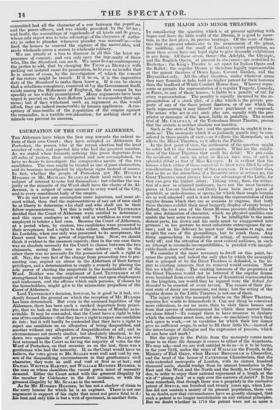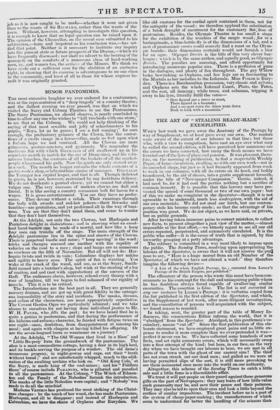THE MAJOR AND MINOR THEATRES; IN considering the question which
is at present agitating With hopes and fears the little world of the Drama, it is good to ascer- tain, in the first place, its precise bearings. Of the score of thea- tres that at present admin.ster to the amusement of the great, the middling, and the small of London's varied population, no more than seven have any legal right to give dramatic exhibitions. in any form. Of these seven, three—the Adelphi, the Olympic, and the English Opera, at present in abeyance—are restricted to Burlettas ; the King's Theatre is set apart for Italian Opera and the Ballet ; the regular Drama is therefore legally representable at the patent theatres of Drury Lane, Covent Garden, and the Haymarket only. All the other theatres, under whatever name they may flourish or fade, hold no higher patent for their honours than the landlord of White Conduit House does. Whoever repre:: seats or permits the representation of a regular Tragedy, Comedy, or Farce, in any of these houses, is liable to a penalty of 501. for every representation. The penalty is equally incurred by the re- presentation of a stock play, of a play which is the private pro- perty of any of the three patent theatres, or of one which the party representing it may himself have purchased or composed. The actors who act in any such play are, equally with the pro- prietor or manager of the house, liable in penalties. The recent trial of Mr. CHAPNIAN, of the 'Tottenham Street Theatre, proves that the statute is neither obsolete nor inactive.
Such is the state of the law ; and the question is, ought it to re - main so? The monopoly which it so jealously guards may be con- sidered in three points of view,—as it affects the Monopolist, as it affects the Minor Theatres, as it affects the Public.
In the first point of view, the settlement of the question might be safely left to the treasurer's accounts. What are the exhibi- tions of the Great Theatres that swell his debit? We put aside the accidents of such an actor as KEAN once was, or such a splendid MIR as that of Miss KEMBLE. It is evident that the houses which either of these contrived, to draw were filled by other considerations than the poetry of SHAKSPEARE. It is evident also, that as far as the attractions of a favourite actor or actress go, the Great Theatres must always have the advantage of the Little, for they can give the higher salary. Taking away, then, the attrac- tion of a new or admired performer, have not the most lucrative pieces at Covent Garden and Drury Lane been mere pieces of spectacle, or melo-drames, or operas, for which their ample bounds are so well adapted? and is it not during the representation of that regular drama which they are so anxious to engross, that both these theatres exhibit their most beggarly display of empty boxes? Indeed, the vast area of the Great Houses presents difficulties to the nice delineation of character, which no physical qualities can enable the best actor to overcome. To be intelligible to the more distant parts, his frown and his smile must be exaggerated into grimace ; in his gesture he must substitute extravagance for na- ture • and in his delivery he must tear the passion to rags; not to split the ears of the groundlings, but to reach them. Any thing approaching to simplicity of acting, of necessity comes tardy off; and the attention of the most critical audience, in such an attempt to reconcile incompatibilities, is puzzled with inexpli- cable dumb-show without noise.
We consider it the more necessary to dwell on this point, be- cause the grand, and indeed the only plea by which the monopoly that is grasped at by the Great Theatres is defended, is the in- jury to existing interests that its removal would occasion. Now this we wholly deny. The existing interests of the proprietors of the Great Theatres would not be bettered if the regular drama were banished from every other house of dramatical representation in the kingdom, nor would they be injured were the School for Scandal to be enacted at every tavern. The causes of their pre- sent state of decay are numerous, not deep; but the acting of the regular drama in the Little Theatres is not one of them.
The injury which the monopoly inflicts on the Minor Theatres, requires few words to demonstrate it. Can any thing be conceived more ridiculous, to say no more, than to shut these houses out from that species of entertainment for which their narrow limits are alone fitted?—To compel them to have recourse to daubery which the audience must nose, not see,—to machinery which they lack space to work,—or to vocalities for which their low domes give no sufficient scope, in order to fill their little Os,—instead of the interchange of dialogue and the expression of passion, which all can hear and mark?
But the injury to the Public from the monopoly comes more home to us than the damage it causes to either of the disputants. We may ask.—and we are well entitled to do so—is it to be borne, in the year i83, under the 'reign of WILLIAM the Fourth, in the Ministry of gail GREY,_when HENRY BROUGHAM is Chancellor, and the head of the house of CAVE NDISH Chamberlain, that the wide-extended metropolis of London,. with its sixteen hundred thousand souls should trudge from its utmost boundaries in the East and the West and the North and the South, to Covent Gar- den, in order to enjoy their national enjoyment of a laugh at the wit of " plump Jack' or a sigh over the sorrows of Juliet? It has been remarked, that though there was a propriety in the exclusive patent of STEELE, one hundred and twenty years ago, when Lon- don did not contain a moiety of its present population, there can be no doubt; now that circumstances have so greatly changed, that such a.patent is no longer maintainable on any rational principles. But.we doubt whether in 1719 the .patent were not as- mere' a job as it is now sought to be made—whether it were not given then ti the wants of Sir RICHIRD, rather than the wants of the town. Without, however, attempting to investigate this question, it is enough to know that no legal question can be raised upon it. The opinion of the Chancellor, on the recent case submitted to his arbitration,—lame and impotent as his conclusion was,—has set- tled that point. Neither is it necessary to institute any inquiry into the present state or future prospects of the Drama,—which we have frequently discussed; nor shall we advert to the bearing of the monopoly on the comforts of a numerous class of hard-working men, ay, and women too, the artistes of the Minors. We think we have made out a sufficient case for the abolition of an exclusive right, in showing that its exercise is advantageous to no one class in the community, and least of all to those for whose express be- nefit it was originally granted.































 Previous page
Previous page